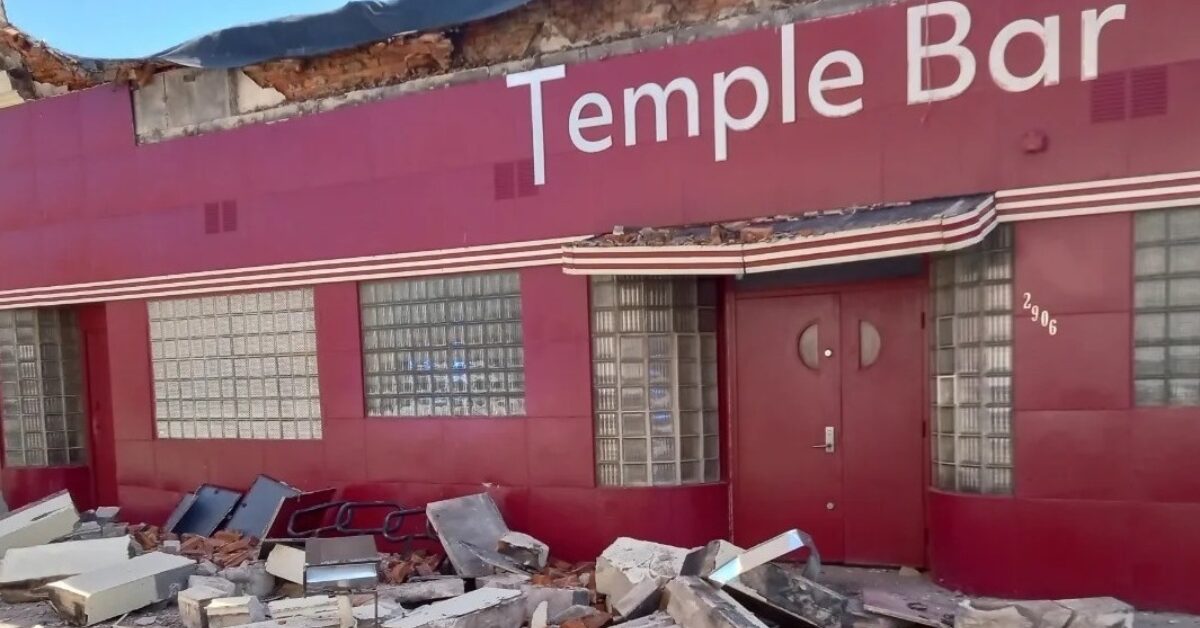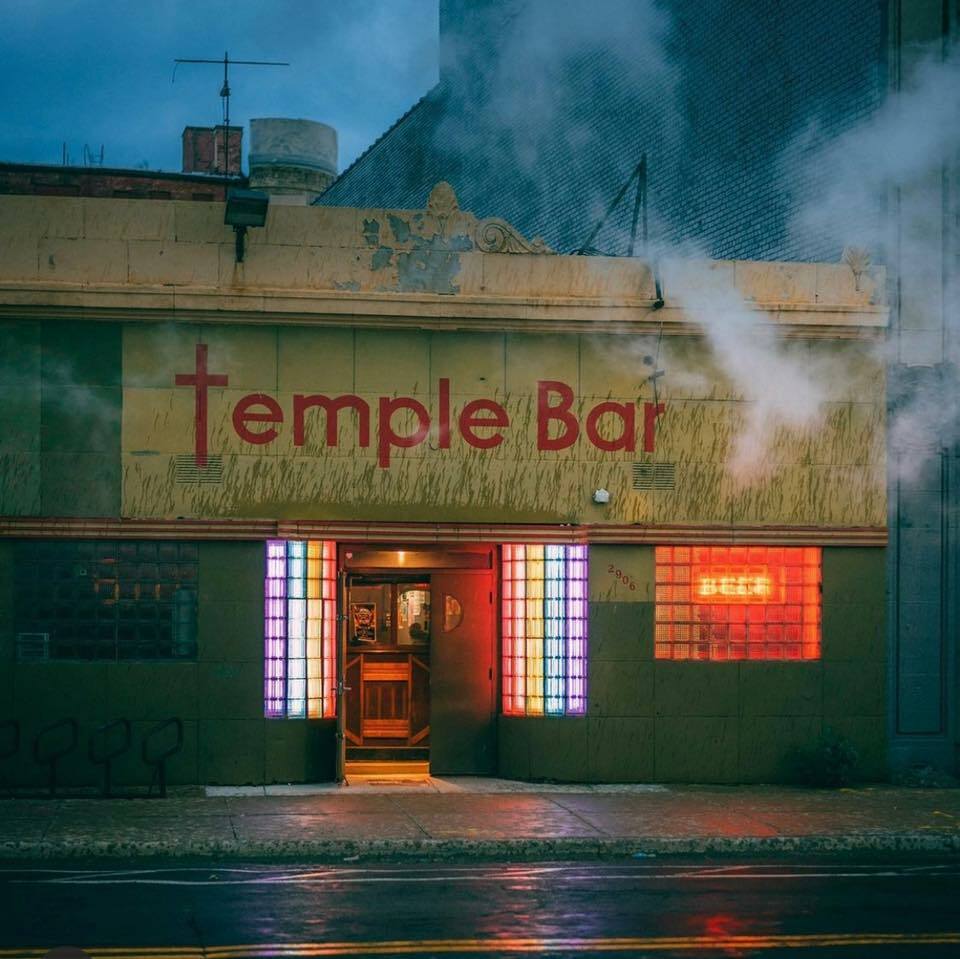What You Need to Know About Temple Bar Closing ‘Indefinitely’ After Building’s Facade Collapses
Community support — and many questions about why it happened — pour in

When the historic limestone facade gracing the front of the iconic queer-loved Temple Bar at Cass and Temple in downtown Detroit crumbled and fell on May 24, the timing couldn’t have been worse — or better.
Yes, the building is closed, “indefinitely,” according to the city’s Building, Safety Engineering, and Environmental Department. It won’t reopen until it’s been repaired in line with current building codes and inspected by the city.
And yes, the facade collapse happened just hours ahead of one of the most profitable annual weekends of the year for the bar, which was set to host 11 DJs for a jam-packed Memorial Day weekend of events related to the nearby Movement Music Festival, including a fundraiser for the Underground Music Academy and a dance party. “We had to quickly cancel everything,” Temple Bar owner George Boukas tells Pride Source.
While he’s understandably worried and upset about the closure, Boukas is also grateful for the timing. What if, he ponders, the collapse had happened when patrons were lined up in front of the bar having a smoke, as is often the case on busy nights? He’ll scarcely let the thought enter his mind. “I’m feeling blessed,” he says. “I really am. This could have been so much worse.”
The damage, Boukas says, is limited to the outside of the building, but until the city determines it is safe for patrons to return, Temple Bar will remain closed. He’s working with several contractors and city officials to get repairs moving and permits issued, including a structural engineer, a masonry repair professional and various city entities.
In the meantime, patrons of Temple Bar, which has been in operation since the Great Depression, have been voicing their concern for Temple Bar’s employees, including Larry Love, who has been managing Temple Bar for 15 years. Love told Pride Source he’s feeling overwhelmed by the outpouring of support. “Our customers have been nothing shy of amazing,” he says. “The outpour of love and concern has been overwhelming and that makes you feel really good.”
Still, Love says he’s worried for his staff, who had been anticipating the revenue and tips that come along with a busy weekend. He’s hopeful fellow bar owners will step up to offer some temporary work for his talented team members and that they’ll be able to wait out the interruption and return to work when the bar reopens. “We’re all in this community together,” he says. “And Temple Bar has been here forever.”

Boukas says he bought the bar in 1988 with the intention of creating a space where everyone was welcomed in. “We’re all human,” he says. “We have very little differences — that’s why I wanted to create a safe space for all 37 years ago.” The world was a very different place in the late ’80s, Boukas notes, especially for queer men, who were navigating the AIDS crisis, which was in full swing. “We were a place where everyone could come, no matter who they were,” he says.
That sentiment has remained at the heart of Temple Bar’s mission and is key to why patrons, like long-time customer Joe Basila, keep coming back. “I just adore that bar and wish them the best,” he says. “It’s a neighborhood bar that makes me wish I lived in their neighborhood.” The Oak Park resident says he makes the trip to Temple because of the excellent dance DJs and great patio space, but also because the bar is “extremely welcome to all who enter.”
“If they needed help clearing fallen concrete to expedite their reopening, I’d be there at a moment’s notice,” Basila adds. “People need places to just dance and have fun, and Temple never disappoints when it comes to those two things.”
Boukas posted to Facebook after the facade collapse, thanking the community for the support and to give an update on one of Temple Bar’s favorite “employees,” his 22-year-old jet black bar cat, Darla. “The entire staff and Darla are safe,” he wrote, adding, “What knocks us down only makes us stronger. I’ll try my best to keep everyone updated. Thanks again.”
Patrons chimed in with words of support and offers of help — and several comments expressing relief that Darla was unscathed. “So glad to hear that everyone is safe, cats and humans alike,” wrote Facebook user Avis Saunders. “If you need anything let us know, wishing you all the best!”
“Stay strong George ❤️❤️❤️,” wrote Simone Mcfarlen. “We will be there when you reopen — hugs to Darla.”
Boukas isn’t sure why the facade collapsed, but a nearby, long-term sinkhole, which has recently expanded and the condition of an abandoned building directly next door raise some questions about whether these issues factored into what happened. Police have closed the lane closest to Temple Bar near the corner of Cass and Temple Street, which includes the sinkhole location. Love said the sinkhole, currently marked by an orange traffic barrel, started opening about a month and a half ago and that reverberations could be felt through the Temple Bar building whenever large vehicles would drive over the hole.
The basement of the abandoned building next door has been flooded and appears to sit at an angle. Satellite imagery on Google Maps shows a collapsed roof that is exposed to the elements atop the building, located at 2900 Cass Ave. The building has been abandoned for at least 20 years and is owned by an entity called Temple Commons, LLC, which bought up several dilapidated Cass Corridor properties around 2008.
Most of these properties remain unrenovated. The building was once a drug store and food market and housed more than a dozen apartments, but it has sat empty and open to trespass for decades. Little is known about the investors behind the purchase except that Illitch Holdings appears to own these properties through sub-corporations.
Pride Source has sent a request for information about the status of the abandoned property and whether the city’s investigation into Temple Bar’s facade collapse includes reviewing the condition of this building to the Detroit Buildings, Safety Engineering, and Environmental Department.










